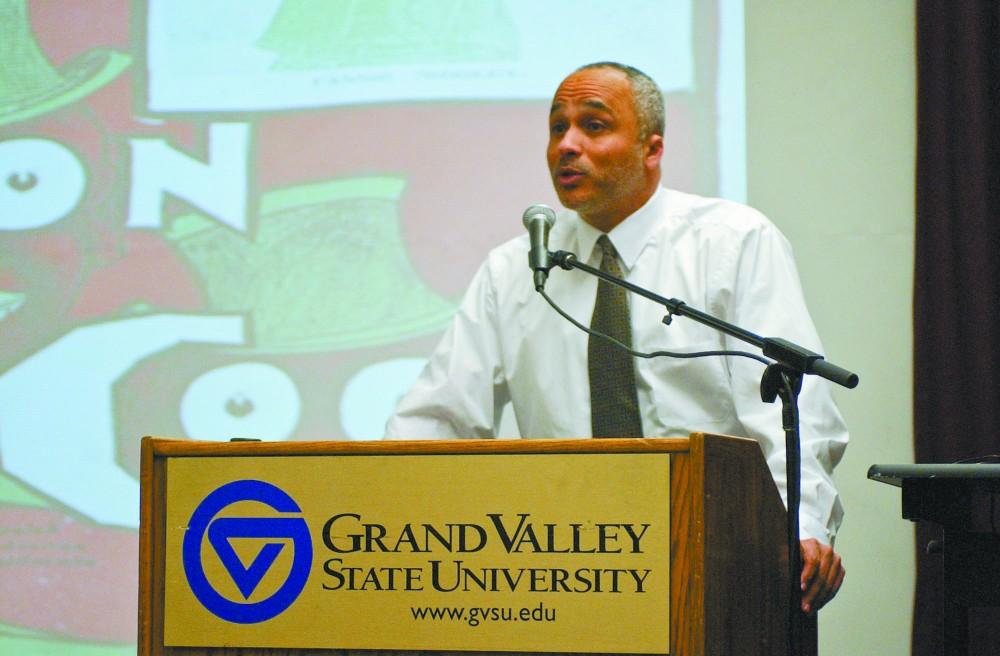‘Every month is Black History Month’

GVL Archive Dr. David Pilgrim speaks to students and faculty at a past Black History Month event
Jan 30, 2012
Grand Valley State University will continue the tradition of celebration with the start of February’s Black History Month, scheduling an event every week to commemorate the history of African Americans’ struggle for civil rights.
“I’m happy for what we have featured for Black History Month 2012,” said Bobby Springer, assistant director of the Office of Multicultural Affairs. “I think we have some educational pieces on here as well where people we be able to learn and grow regarding what has happened over time regarding black, African American people in general.”
The month of events will kick off on Feb. 2 with “Not Just a Game: Politics and Power in American Sports”, which will feature former Olympian John Carlos, who was banned from the Olympic Games following his bronze medal-win for men’s 200-meter race in the 1968 Olympics. Carlos, along with gold medal winner and teammate Tommie Smith, stood on the Olympic stage with Black Power-fists raised to the sky as a public display of Black Power and human rights.
Along with Carlos, renowned sportswriter Dave Zirin will show segments of his documentary. The two men will discuss their book, “The John Carlos Story: The Sports Moment That Changed the World.”
“Sports cuts across all of the different races, so he’ll talk about what’s happening in sports, especially from Dr. John Carlos’ perspective and some of the things that he went through as an Olympian,” Springer said. “To know that many, many years later that he’s still banned from the Olympics because of what he believed in. He thought that it was very important for him to make a stand and because of that he’s not allowed to participate, in any fashion, in the Olympics.”
New to this year’s schedule of events is the Feb. 11 service learning trip to Guiding Light Mission in Grand Rapids and the Mel Trotter Ministries in Jenison, led by a team of GVSU students, faculty and staff.
“Dr. Sherry Johnson, thought it was important to include that service piece because, you know, that’s what it’s all about,” Springer said. “Giving back, educating, letting people see other phases of life so we can all learn and grow.”
Students who want to be involved in the trip can sign up through the GVSU’s Community Service Learning Center. Spaces are limited.
GVSU will host the Positive Black Women Annual Poetry Jam on Feb. 14 in the Kirkhof Center’s Grand River Room, followed later that week on Feb. 17 by “A Taste Of Soul,” which will offer students the opportunity to try and learn about African American soul food traditions.
GVSU professors will offer their own insight on Black History Month, beginning with assistant professor of philosophy Dwayne Tunstall’s lecture “Has African American Literature Really Ended?” on Feb. 22, followed by Dean of Seidman College of Business’ H. James Williams on Feb. 23.
On Feb. 24, West Michigan-based soulful R&B, blues and jazz band SOULTRY Entertainment will bring “Real. Soulful. Music” to the Pew Campus’ Loosemore Auditorium for a performance.
The week will wrap up with a talk by Diane Nash, legendary member of the civil rights group The Freedom Riders. Nash will give a presentation on Feb. 28 titled “1961, The Freedom Riders and Our Struggle for Racial Justice.”
“We end it with someone from the Freedom Riders, someone who participated,” Springer said. “She was about 19 or 20 when she did it — similar to a students’ age. So imagine your age in this really ugly time, you know, where people just didn’t like you because of how you looked, the color of your skin.”
Nash became involved in the nonviolent movement in 1959 as a student studying at Fisk University. In 1960, she began chairperson of the students sit in movement in Nashville. In 1961, Nash went on to make history with the coordinating of the Freedom Ride from Birmingham, Ala. to Jackson, Miss.
“They just knew it was the right thing to do, but didn’t know the impact that it would have for generations to come,” Springer said. “To have her (Diane Nash) on our campus to share with us what that moment was like, as well, and what she’s learned over the years and how does she think things are today. Have we made great progress? I think we have, but in her eyes ¬?¬?— someone who was there and in the middle of it — how does she relate that to what’s happening today.”
All events aside, Springer said Black History Month reaches beyond just the month of February.
“We celebrate it, we have the month of February that we celebrate, but every month should be (Black History Month),” Springer said, holding up a pin that read ‘Every Month Is Black History Month.’ “It should be all of the time.”

























